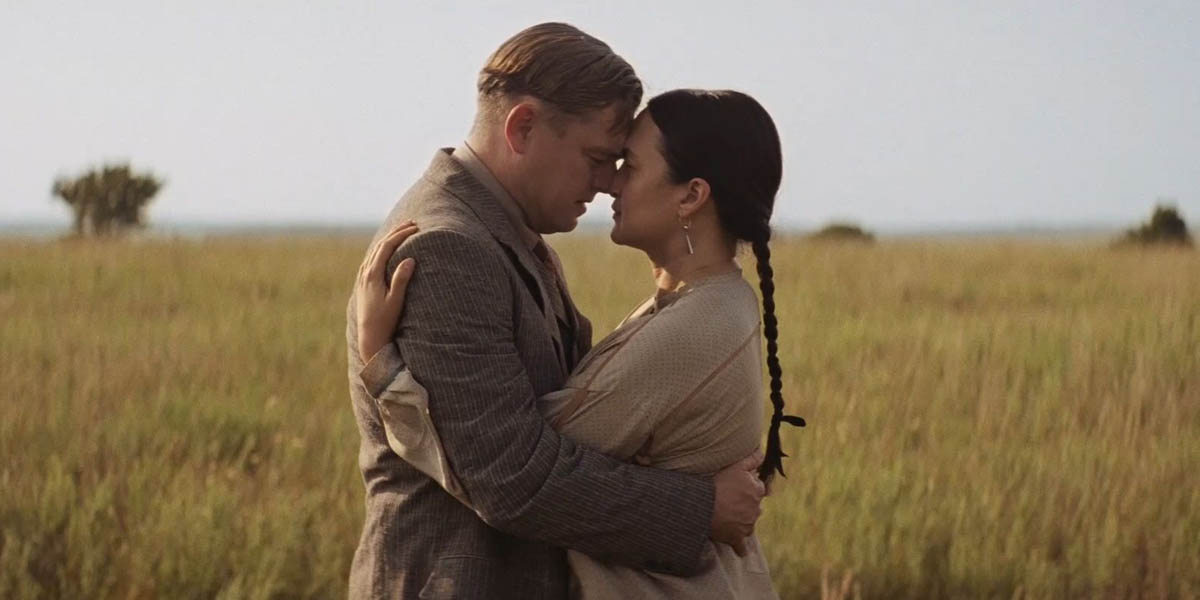
What does love look like? The genocidal “romance” of Killers of the Flower Moon
Opinion + AnalysisRelationshipsSociety + Culture
BY Joseph Earp 19 DEC 2023
Killers of the Flower Moon, the newest film by Martin Scorsese, starts with a terrible, distorted version of the romantic “meet-cute.”
Ernest Burkhart (played with leery relish by Leonardo DiCaprio) romances Molly Kyle (Lily Gladstone). He’s a driver; she needs to get around the place. Throwing knowing looks over his shoulder as he spins his wheel, he flirts with her, and though she is initially suspicious, eventually she succumbs to his interests. A romance is born.
It is the classic “boy meets girl” story – or at least, it would be, if we didn’t already know the real reason driving Ernest’s romantic designs. He has been put up to this meeting by “King” Hale (Robert DeNiro), his calculating and murderous Uncle, who is seeking to redirect the fortunes of the Osage tribe of which Molly is a member. Though he projects an image as a pillar of the community, King is the centre of a string of murders – and Ernest is recruited as his budding killer-to-be, with Molly as a target.
The tension at the heart of Killers of the Flower Moon lies in Ernest’s dual role as Molly’s wife and her poisoner. Though Ernest is the film’s main character, we are given little in the way of his interior life. Instead, we understand the man through his actions, which are, increasingly, in direct conflict. Ernest acts like he loves Molly, and the children they have together; he weeps when one dies. He also injects her daily with a poison. When, in the film’s climax, the pair are reunited, he almost collapses into her arms. Nobody outright asks Ernest if he loves Molly, but they ask similar questions, and he responds in the full-throated affirmative. She is his wife, and at least some of the time, he treats her as such.
So, do we want to accept this kind of attachment – murderous, openly destructive – as a form of love? Or would doing so fundamentally taint the concept?
Love as a blinding force
The ethical value of love has long been debated by philosophers. Plato and Socrates both saw love as a fundamentally morally valuable emotion – one which expands our sense of the world’s beauty and possibility, and motivates us to do better. Indeed, according to this view of love, romance is the foundation of ethical action.
It’s a way of teaching us of the importance of other people, an escape from selfish solipsism that draws out into the world.
But love – as the mere existence of the term “crime of passion” proves – does not always lead us down virtuous paths. Any romance also has the capability of reducing ethical scope, not expanding it. Arthur Schopenhauer, the notorious pessimist, saw love as an essential “illusion” that consumes people utterly. He described it as little more than the desire to procreate, over which the fiction of romance gets written. On this view, love creates a lopsided sense of ethical value, transforming the world down to a single point – the love object. This in turn breeds jealousy; possession; and, Schopenhauer said, frequently madness.
What makes Ernest’s “love” distinct, however, is that he doesn’t seem to experience the usual ethical pitfalls of romance. He’s not jealous of Molly. He doesn’t act as though he wants to possess her – at least not in the normal sense. Nor does he, in the traditional sense, go mad. Instead he acts to destroy her, an essentially self-negating series of actions where the one he prizes the most is also the one he seeks to snuff out.

Love in and of itself
Perhaps ironically, given his reputation as a cold, difficult and abstract philosopher, it is Immanuel Kant who provides the solution to the puzzle of Ernest’s love. Taken as a whole, Kant is paradoxical on the nature of love – he once dismissed it as a “feeling”, and wrote that “a duty to love is an absurdity.”
But, importantly, Kant did believe we should love one another. And more than that, this was a duty to love another “in and of itself.” One of Kant’s key ethical positions is the idea that using another – treating them like a mere “means” – is wrong. Instead, he believed that we should view other people as an “ends”. Kant believed that value did not exist outside human beings – that we create value – and that we should view all others, including those we love, as the source of value in the world. We respect and love others, he thought, because we see them not for what they can do for us, but for what they are; what they value and what they care about.
Ernest does not do this. Both of the ways that he treats Molly – doting on her and poisoning her – are for his own benefit. He has turned her into a mere object, a machine for love and money. She gives him children, and her death will give him riches and success. When he falls into her arms and embraces her, he is embracing not the whole Molly – the full, rich person, a source of value in the world – but only the parts of her that help him.
In this way, Ernest’s broken form of love serves as a warning to the rest of us.
When we say we love someone, we should direct that emotion to all who they are. Not choosing the parts we like, or the parts that service us. But the difficult parts; the awkward parts; the fears and the pains as well as the highs.
A lover’s eyes should always be open, after all.

Ethics in your inbox.
Get the latest inspiration, intelligence, events & more.
By signing up you agree to our privacy policy
You might be interested in…
Opinion + Analysis
Business + Leadership, Society + Culture
There’s something Australia can do to add $45b to the economy. It involves ethics.
Opinion + Analysis
Health + Wellbeing, Relationships
Ask me tell me: Why women think it’s ok to lie about contraception
Opinion + Analysis
Health + Wellbeing, Relationships
Are there any powerful swear words left?
Opinion + Analysis
Politics + Human Rights, Relationships




